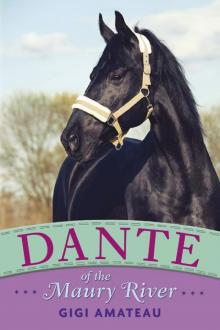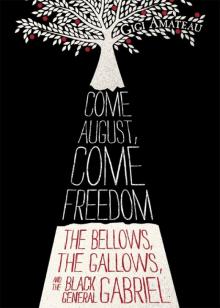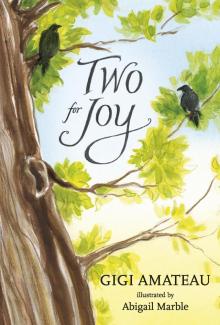- Home
- Gigi Amateau
Come August, Come Freedom Page 8
Come August, Come Freedom Read online
Page 8
Unanimously, the tribunal disapproved of the way Thomas Henry Prosser allowed Gabriel to move about the countryside unchecked and even into the city, though every man on the court had made use of Gabriel’s services for his own personal gain.
When Mrs. Younghusband desired an entry gate to her garden — one adorned with forged rosettes — Pleasant Younghusband had hired on Gabriel. No other blacksmith possessed the skill or patience to meet Mrs. Younghusband’s standards of quality. The coroner detested the practice of hiring out, which allowed bondmen to earn cash. “It undermines our entire system,” he often said, but his wife’s contentment mattered most.
What bothered William Foushee was Gabriel’s pride. “If only he would act more agreeable, more aware of a man’s stature,” Foushee said. “Why, he even refuses to call Prosser himself ‘master.’”
“Agreed, Dr. Foushee. He swaggers about the city and the countryside with the airs of a man born of a higher position,” Gervas Storrs observed.
Nor did the court hold Thomas Henry guiltless of Gabriel’s conduct. “Had young Prosser maintained proper control over his property,” Hezekiah Henley reasoned, “Johnson would have his ear, the pig his slop, and we would all be melting butter over our Sally Lunn bread.”
“They both love money above all else. Let them each feel this in the deepest possible way,” George Williamson recommended.
The gentlemen of the court of oyer and terminer sentenced Gabriel to jail and set his bail at one thousand dollars. The upstart planter and his proud bondman could reckon with each other over who would pay. With further punishment and high bond set, the court sent this message to Thomas Henry Prosser: Get control of your property!
Thomas Henry may have desired wealth above all else, but the court was mistaken about Gabriel. He desired something other than money. Whosoever believed a hot brand, a jail term, and a high bond would sour Gabriel on liberty would soon discover that Gabriel was, indeed, born of a higher mind than the court had reckoned.
HE HOPED Nan would wait. He hoped that when he returned, she would still marry him, as they had planned. For the month Gabriel sat in the damp, sour jail with no word from Thomas Henry and no way to get word to Nanny, this hope saw him through each day. I’ll return to Brookfield, and I will marry Nanny.
For the first week of his sentence, he kept near the door of his cell, looking out, sure his old playmate would come. At two weeks, he let himself recline against the crumbling clay wall, still certain: Thomas Henry will come.
At three weeks, Gabriel would have cursed himself for having had any faith in anyone, but every day Jacob Kent passed fish and greens and hard biscuits through the outer cell window. Gabriel’s teacher also brought news from the smithy — a source of sustenance. “The whole city is talking about you. Some are cautious. Worried about what might be brewing in the hearts of bondmen. Others say you are a hero. All agree you are a man to be feared,” Jacob told him.
“No reason for anyone to be afraid as long as I sit in this cell. Thomas Henry should be scared to his core for when I get out.” He didn’t bother to lower his voice.
Gabriel ate every bit of the food Jacob brought him and spared no morsel for the rats that shared his cell. For them, he left the watery porridge provided once daily by the jailer.
In early November, Thomas Henry finally appeared at the jail. “Come with me now. I have been summoned to court to guarantee your good behavior, including and especially toward Absalom Johnson,” he said to Gabriel.
Without glancing up from his spot by the cell door, Gabriel asked, “How can one man guarantee the acts of another?”
Thomas Henry ground his teeth together. “I know you better than anyone. Come with me now.”
“No. I know you. You are the same boy, lit with greed yet still not King Carter.” He would wait in jail forever before he groveled to Thomas Henry.
Thomas Henry pursed his lips and stiffened his jaw. “Gabriel, you’re coming home, and I must sacrifice a great deal for your release. It will cost me a thousand dollars to get you out of here and will cost you the same. The question is, how will you repay me?”
Gabriel turned toward the window, away from the cell door, away from Thomas Henry.
“We were friends once,” Thomas Henry said.
“I was a child,” Gabriel replied. He stroked the place on his forehead that marked the day Thomas Henry became a man. “You have grown up more barbaric than your father.”
“Gabriel, your father was a rascal, to be sure, but I don’t recall him gnawing off a man’s ear.” Thomas Henry lowered his voice so that only Gabriel could hear him. “I can tolerate your night walking to the colonel’s place, your impending marriage, which will yield me nothing, and even your sauntering here, there, and yon as you please. But this . . . this business with Johnson.” Thomas Henry’s temple swelled up and throbbed out in time with his heart. The young planter pressed his forehead against the bars. His voice cracked. “My peers whisper behind my back. My future father-in-law reprimanded me in public. The gentlemen of the court — my father’s friends —” Thomas Henry stopped talking when the jailer passed by.
Sometimes when Gabriel listened out the cell window, he heard the people talking nonsense — the boatmen, the washerwomen, the laborers of Richmond. Yet sometimes they spoke of a faraway island, convinced their freedom would soon come. And sometimes in the mornings, he heard them sing of Gabriel and glory and righteous peals of thunder. He needed out.
Gabriel turned back over and said to Thomas Henry, “I got five hundred hidden away. I can get you your money only if you get me out.” He stood up, and the usually unflappable rodents scattered away under the bed and back into the walls.
After the court released them, Thomas Henry sat ready to drive back to Brookfield in the same cart that had brought Gabriel to Richmond when he was a boy. The leather seat was now torn, its stuffing falling out, and the bay mare’s muzzle was turning white.
Gabriel bypassed Thomas Henry and headed east down Main Street, toward Jacob Kent’s forge, in the opposite direction from Brookfield.
The Prosser cart pulled up beside him. “Stop! Gabriel, get in here right now!” Thomas Henry shouted while he fought to bring Old Major’s bay mare to a halt. “Your pride and your insolence have cost you an awful lot lately.”
Gabriel kept walking.
“Do you want to end up back in jail?” Thomas Henry stood shouting in the gig.
He kept walking.
“Are you a common criminal, then?”
People around them stopped minding their business to watch the quarrel unfolding. A constable stepped up to Gabriel’s elbow. Still Gabriel kept walking.
“Get in,” Thomas Henry ordered.
He refused. “I’ll earn you better here in Richmond with Jacob Kent than in Caroline or Hanover. You want your money, you leave me be.” Gabriel eyed the constable, who stood ready to assist Thomas Henry, eager to subdue Gabriel. “Leave me be, Master.”
He did not look back again, even when Thomas Henry called after him, “Wait, Gabriel. We can work this out. Wait.”
I have waited too long for too little, Gabriel thought. He neared Jacob’s forge and said out loud, to no one but himself, “My plan has changed.”
Again, Gabriel took his problem to the fire and the anvil.
GABRIEL HAD seen Charles Quersey before and shod his stallion, but Jacob had always dealt with the Frenchman directly. This time, Quersey stopped in the smithy to have his pistol repaired and asked for Gabriel.
“I’ve heard about you,” Quersey said. “Are you able to read?” The man handed Gabriel a leaflet telling of America’s new alliance with Saint Domingue.
The leaflet was old, from the springtime, yet still Gabriel’s spirit was ripe to hear and ready to read how his own liberty was entwined with the now-free Caribbean island.
Gabriel touched the paper to his heart the way Ma used to touch her Bible, then handed the leaflet back to Quersey.
Quersey pres
sed the page back into Gabriel’s hand and also a small card bearing his name. “We are sons of liberty, Mister Gabriel. To truly be American, to be truly French, is to be free. I will not rest until every man is free. And you?” The French visitor left the forge without his gun.
Later, Gabriel asked Jacob, “Do you know Charles Quersey?”
“The Frenchman? Said to have been at Yorktown when ’Wallis surrendered. What’s your interest in him?”
Gabriel thought first to fib, but Jacob had never given him reason to run or hide or be anything but a truehearted man. He showed the newsprint to his teacher.
While Jacob read the leaflet, Gabriel watched him and waited for his teacher to look up. “I desire liberty for all the people, too,” Gabriel told Jacob. He waited to see, on this day, what kind of patriot Jacob Kent would show himself to be. “Now. Jacob, I want freedom now, not tomorrow or in one year or ten years or one hundred. Right now.”
Jacob spoke softly, almost to himself. “You were a boy when you came here, wearing those damned fancy clothes that belonged to someone else and those small shoes that pinched up your feet. Not the casings of a smithy, eh? No, you were not yet the strapping, gifted smith standing here. But on the afternoon when we first met, I knew who you were.” He touched Gabriel’s temple. “You are your father’s son, Gabriel. Privileged men’s notions of a convenient liberty could never fool you or your father. And, Just-Gabriel, you are a man now.” Holding the paper, Jacob’s hands trembled. “Will you agree that your old teacher has treated you fairly?”
Gabriel took the aged, familiar face in his hands. I could never hurt you, Jacob, Gabriel thought, then he tried to explain. “Teacher, I was going to marry Nan. I planned to buy her freedom and then mine, but Johnson threatened to harm her. There is no law to protect my woman from such a villain. I am a man, Jacob. Nanny’s man. What was I supposed to do?” Gabriel asked. “What am I supposed to do right now?”
Jacob nodded slowly. “Son, there is no right now with liberty. Freedom takes time and patience.”
“I have never disagreed with you, but, truth is, there is only right now. And there is only one choice left for this business of liberty,” Gabriel told him.
“Do not mistake politics for principles. Adams is on Toussaint’s side because of America’s concerns with France, not because America believes in Toussaint,” said Jacob.
“Jacob, is freedom not America’s concern?” Gabriel asked him. “This forge is your own. You work and move about the city as you please. Do you love your freedom?”
“None but the wealthiest men among us move about fully as they please,” said Jacob.
Gabriel lowered his head in disappointment.
“You deserve your freedom because you are entitled from birth,” the old smith continued. “Liberty is a God-given right, Gabriel, not for man to dispense or withhold at will. But, son, I am old now. I have lived through one war.”
“But this is the unfinished business of your war,” said Gabriel. “There is no other choice left for me. Will you help me?”
The old man clung to Gabriel. “Yes, I will always be here, should you need me.”
For six weeks, Gabriel worked in Jacob’s forge, before returning to Brookfield. Jacob gave Gabriel the larger share of his profits for that time, and soon the Henrico blacksmith’s pocket was full of money. Still, the money he had earned was not enough to fully repay the bond to Thomas Henry and not nearly enough to manumit Nanny.
I return with only my heart and my hands to offer her, Gabriel thought, and he walked on back to Henrico.
Over and over on the road, he stopped, unfolded Quersey’s leaflet, and looked at the written-down story of Toussaint L’Ouverture’s success. He opened up the page to see the truth: all the world over, humanity now reached up to God and people reached out to each other for freedom.
Alone on the way back to Nanny, Gabriel recalled Toussaint’s cry to his people: “Death or liberty!”
Toussaint raised an army of four thousand and repelled the French and the British troops. Toussaint, who can read and write. Toussaint, but a slave. Toussaint, the black general. He thought of the game he and Thomas Henry once played.
“Yes!” Gabriel said aloud. “Death or liberty!” This time, the words were not a game to him, for now Gabriel believed.
WHEN GABRIEL returned to Henrico, the harvest was all picked and winter nearly arrived. The tobacco at Young’s and at Brookfield was being pressed into the hogsheads, good separated from bad, and readied for the market. An early snow had come and gone already. Trace mounds of white clung to the shady hollows around the brook, but as was often wont to occur in a Virginia December, the sun interrupted the dead season to mimic springtime for a day or two.
So on Saturday afternoon, Gabriel went to meet the folks under the apple tree at Brookfield. They would make their way to Brook Bridge to meet up with the kin of blood and the kin of spirit — kin from all around the neighboring farms. Such a warm winter Saturday stirred people from all around the countryside. The time permitted them to leave their work was short, so all the people made haste to Young’s spring.
Once gathered, the little children would go and sneak their feet into the ice-cold creek. The elders would be there, counting among themselves who still lived and lamenting together what they had been left to endure. Yet, despite the burdens laden on each, on this day, the people would make praise.
Gabriel reached the meeting place by his tree early. He could hardly keep up with the anxieties swirling through his mind. Will Nanny want me? What if she fell in love with Jupiter while I was in Richmond? What if the old colonel sold her south? Or hired her out to Johnson?
Gabriel took the pamphlet from Charles Quersey out of his pocket. He sat beneath the apple tree, reading, awash in the liberation of Saint Domingue. For a time, he set his own yoke down. President Adams’s recognition of Toussaint’s leadership swelled a new kind of belief in Gabriel — the kind of hope for himself and his kin that could not be bought, even with all the money he might make for the rest of his life.
They broke free! Liberty prevails on Saint Domingue. A man like me — Toussaint! Toussaint saved his people with a heart and a sword for freedom, and now America protects Toussaint! Ma would invoke the Lord God if she were here with me, Gabriel thought. For the first time in his twenty-three years, Gabriel now asked something of God, too.
If you be the true God, Gabriel prayed, then tell me, who will save me and my people?
It was Nanny’s voice, not God’s, that answered. His beautiful woman came running up the hill, waving her arms and calling his name. “Gabriel! Gabriel, it’s you!”
Solomon and Martin could not keep up with her, and Jupiter could not keep up with any of them. Nanny slid under Gabriel’s shoulder. “It’s you they’re askin’ for at the spring; we’ve been lookin’ all over for you. Come, join us!” Nanny took up his hand and kissed the mark of the cross, only recently seared into his palm. “Come! We’re all waitin’ for you.”
Wearing her best dress, one she had made herself from the handed-down wedding gifts of sky-blue cotton fabric and yellowing old lace, Nanny hooked her arm through his and led him down the hill. “We are way late jumpin’ the broom. I waited for you, Gabriel. We all waited for you; no more waitin’ now.”
He let Nanny pull him down the hill a few steps, then he stopped her. “Toussaint won, Nan.” He held the worn article out to her. “Have you heard?”
Nanny covered up Gabriel’s hand with hers. “Come to my house tonight as my husband and read this story to me by the fire.”
They had no hog, no calf or great feast of any kind. Gabriel did not even have time to run get his own handed-down gift of Jacob’s old velvet overcoat. In his soiled, graying work shirt, he married Nanny by the creek on a May Saturday in December, so common to Virginia.
He returned to the countryside with a cross burned into his hand and having barely escaped the gallows. He had relinquished all of Nanny’s freedom money and more to
Thomas Henry and so had no wedding gift to offer. No way to keep his promise. Yet by the time he married her, Gabriel could see the only true way. Now his true purpose no longer lay dormant or hidden within. The way was clear now. The work of his life was not to make fire but to make freedom. After the wedding, Nanny received the congratulations of the women, and Gabriel gathered the men near to talk about the business of liberty.
HE’S MY husband now, Nanny said to herself. She kissed Gabriel’s hands while he slept.
How I have missed these hands.
On their wedding night, Nanny made it so that Gabriel rested well. While Gabriel slept, she sat curled up on the bed with her knees tucked around his shoulders. She laughed at how his feet hung well off her bed and smiled at how he had not complained but instead promised to build them a new bed — one with room enough for a man and his wife to love each other good.
Nanny kissed his eyes. How I have missed this man.
She cradled his head against her thighs, and with her finger, she drew along the two scars on his forehead, and then she kissed those places. “Here, too, they marked you. I know this story.”
She traced Gabriel’s long and bony, lovely brown face until all his twitching ceased. She touched the two scars again, then lingered her fingers over his brow. She followed the outline of Gabriel’s nose, his chin, and by the time she reached his lips, Gabriel was deep in sleep. She watched him until his eyes darted back and forth under his lids.
Nanny’s mind was too busy for sleep, so she rose to sew and clean by the moonlight.
Tomorrow is Sunday, a day of rest even for the likes of me. I’ll sleep tomorrow, under the tree, and make Gabriel let me set my head in his lap to catch up on these lost hours.
She could tell Gabriel hadn’t washed in weeks; his britches smelled of red cedar and apple wood, smoke, and hard work. She picked up his shirt and pants from the floor, and while he slumbered, Nanny beat his clothes free of all flecks and bark and briars.

 Macadoo of the Maury River
Macadoo of the Maury River Dante of the Maury River
Dante of the Maury River Come August, Come Freedom
Come August, Come Freedom Chancey of the Maury River
Chancey of the Maury River Two for Joy
Two for Joy